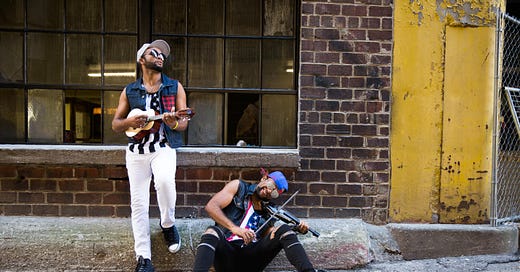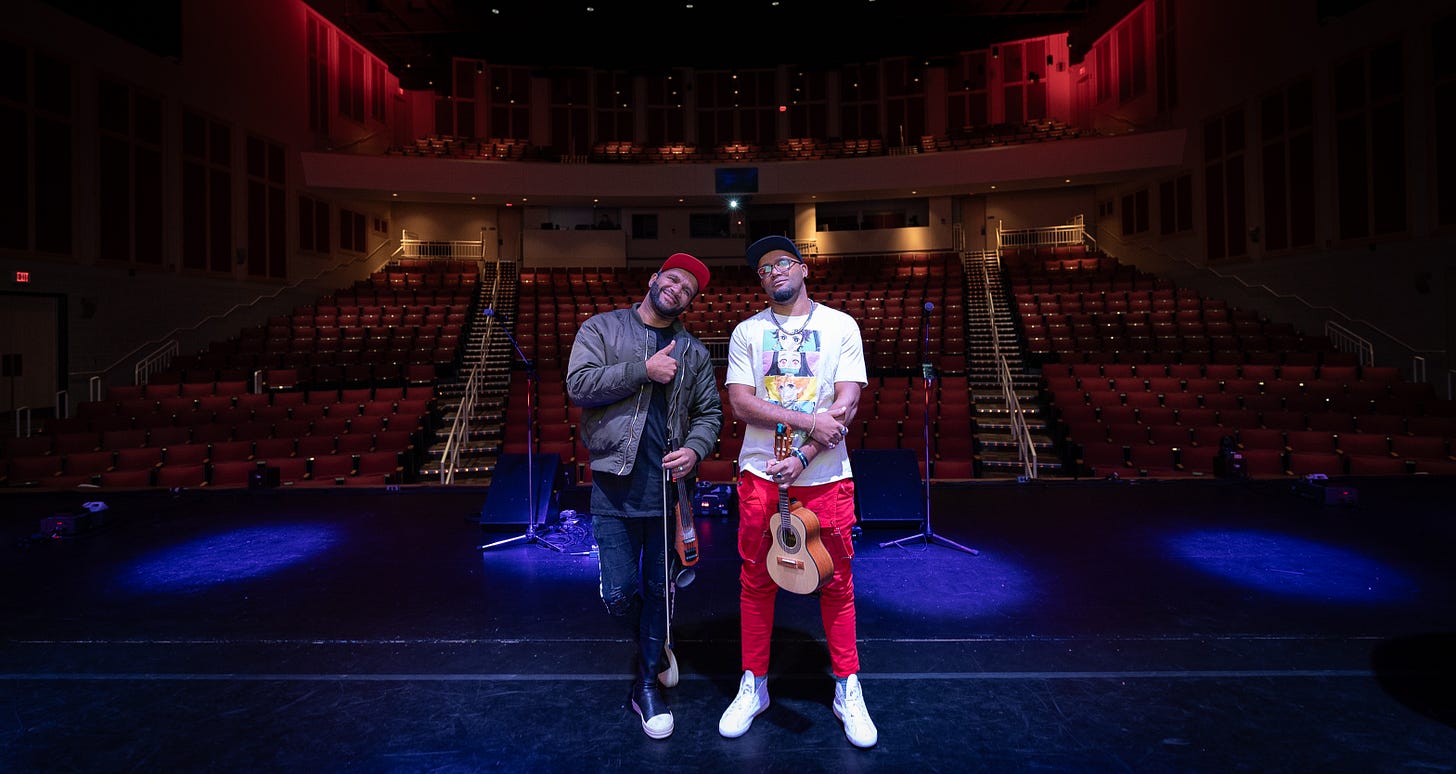The Brazilian 2wins: Returning to Brazil To Begin a New Chapter
These Afro-Latino twin musicians rose from the favelas of Rio de Janeiro to rock stages across the US. Today they prepare for their Iowa farewell tour and return to Brazil.
By: Christina Fernández-Morrow
In the hills of Niterói, Brazil, under the dim light of a single lamp, an expert luthier carefully carves Pernambuco, the prized wood for making violin bows. As he works, he formulates a plan that will change life as he knows it. He hands the finished violins to his eleven-year-old twin sons, inadvertently providing them an escape from the poverty of the Rio de Janeiro slums they called home.
“Our first contact with music was through our dad,” shares Wagner. “He was a violin maker, but he didn’t play the instrument. He forced my brother and me to take violin lessons so we could try out his products.” What began as a quality control measure for their father’s work became their ticket to the world.
Twenty years later, Walter and Wagner Caldas rock stages across the United States as sought-after musicians with a loyal following. Before they were the Brazilian 2wins, the Caldas brothers performed with the favela’s orchestra, where local media learned about them and introduced their talent to a larger audience. “We got a lot of attention because we were the first Black boys from the slums playing classical music,” shares Walter. “We even got the key to the city.”
A Chance Encounter Leads to Iowa
That notoriety led to interest from National Public Radio who interviewed the brothers after a set in their hometown. NPR was so intrigued that they concluded the interview in the twins’ home the next morning, despite the Caldas’ reservations about the potential dangers. The broadcast caught the attention of the organizers of the World Food Prize, who then booked them for their event in Des Moines. They played one song. The president of the University of Northern Iowa (UNI) was in attendance and was blown away by their talent. He offered them a full scholarship to UNI.
“We didn’t even tell our parents that we got a scholarship,” recalls Walter. “It happened so fast and was so hard to believe.”
A few weeks later the 21-year-old twins were on their way to Iowa. Once in Cedar Falls, the Caldas brothers had to learn English and adapt to the culture. They made friends through music, joining a band and shifting from classical to pop and rock. Upon graduating, they focused on their music, taking every gig that came their way. They quickly became known and loved for their creative covers of popular songs and their contagious energy on the stage. Whether playing at a packed venue, or a small bar, they brought excitement and dreams, often ending the show by telling the crowd, “We gotta catch a flight to New York City in the morning,” although it was only a dream in the beginning.
Dreams, Challenges, and Giving Back
While dreaming of global fame, they had realistic expectations. The Caldas hoped to make as much money as possible to send home to their parents, and return to Brazil in two or three years. But, launching a music career that could support two households was challenging. Along the way, Wagner spent nearly a year battling aggressive cancer. They each met partners, fell in love, and started families. Visiting Brazil became more difficult and years went by they were unable to return.
After dedicating tireless hours and two decades to creating music, building a fan base, and achieving their dream of touring the country, they decided it was time to focus on their home country. “The culture here is way more of a work lifestyle, rather than social,” says Wagner. “We have done the work side.”
His brother agrees. “We made the United States our home for 20 years. We love it, but we’re chasing quality of life now,” shares Walter from their Des Moines studio where they’ve been writing songs in Portuguese for their return to the Brazilian music scene.
Their dad’s violin-making days are behind him as he waits for his boys and their families in a home far from the violence of the favelas where his twin sons began their journey. The musicians are excited to enjoy time with their parents while they are still mobile, active and healthy. They want their children to know Brazilian culture and learn their native language. Throughout their career sending part of their earnings to their parents, the family built a spacious house in a safer section of Rio de Janeiro where the twins will live with their wives and children as they build a new life there.
Although they plan to move to Brazil in late July, their U.S. fans will see them again.“We plan to come to the United States four times a year to tour, so we will be back,” assures Wagner.
Farewell Iowa: Final Tour Dates and What’s Next
The duo is already planning a fall tour with cities and dates to be announced. For now, they are focusing on the state that started it all.
Their Goodbye Iowa Final Run Tour kicks off July 3rd at West End Park in Marshalltown, followed by a show where it all began in the Cedar Valley – at the Riverloop Amphitheater. Their final 2025 Iowa show will be at Jasper Winery in Des Moines on July 10, a free event that promises to be a high-energy celebration and farewell (for now).
From their father's workshop in the favela of Niterói to stages across America, the Brazilian 2wins prove that music is a universal language that can bridge continents, cultures, and dreams. As they prepare to write their next chapter back home in Brazil, they carry with them not just the lessons they learned from their North American adventures, but the knowledge that home is more than just a place; it's where family and music intersect to create joy.
To stay up-to-date with their journey and learn about upcoming performances, check their website, or follow B2wins on social media.
Hola Iowa Substack is part of the Iowa Writers’ Collaborative. We are from around the state and contribute commentary and feature stories of interest to those who care about Iowa.





I'll always remember their concert on the Equitable building rooftop on a perfect late summer evening and applaud their move to re-embraxe their culture, home, and family.